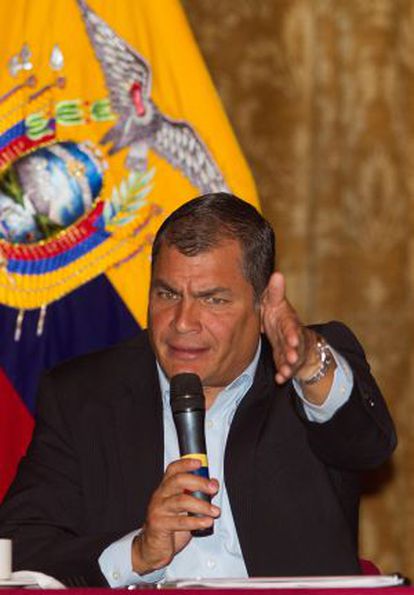Ecuador reporters accept self-censorship
In the year since new media law went into effect, 125 complaints have been filed against the press

Four newspapers in Ecuador are waiting to see whether they will be fined for failing to report on every detail of an official trip to Chile by President Rafael Correa on May 13 and 14.
Correa was scheduled to accept an honorary degree there, but he also met with Chilean leader Michelle Bachelet among other activities.
The complaint was filed by an agency called the Citizens’ Communication Observatory, but only after Correa encouraged the move in his Saturday program of May 17.
“Organize yourselves, denounce it,” he told his audience, brandishing the news reports that he found excessively short. “They are taking away our right to be informed [...] They [the media] are providing a public service, which is to inform the people [...] React, people of Ecuador!”
This is just one of 125 complaints against media outlets registered until June 20 thanks to the Communications Law, which is now one year old. This piece of legislation is the government’s main tool for pressuring the media. One specific result was the decision by the daily Hoy to stop putting out its print edition because of “the gradual loss of liberties” and economic distress.
We need to move beyond this battle between the media, the journalists and the government”
Arturo Torres, El Comercio
The complaints are chalked up by the Superintendencia de la Información y Comunicación, an agency created specifically to help implement the Communications Law. Carlos Ochoa, the agency chief, said last week that only around 20 complaints have led to administrative sanctions. Most resulted in nothing more than a letter of complaint, although there were a few fines as well. The newspaper El Universo was told to pay $100,000 for publishing a cartoon poking fun at the raid on the home of Fernando Villavicencio, a journalist who advises an opposition deputy and who is being investigated for espionage.
While not very numerous, these slaps on the wrist have managed to cow part of the media and the reporters who work for them. A gathering organized last week by a media studies foundation, Fundación Andina para la Observación y Estudios de Medios (Fundamedios), noted the lack of investigative reporting in the media, and observed that these tend to prioritize non-controversial issues that do not affect the government.
“You cannot publish anything about preliminary legal investigations or any classified documents. There are articles in the Communications Law that curtail that,” says a reporter at a national newspaper who declined to have his name in print. “Subsidiary responsibility means the media restrict certain kinds of information because of the fines.”
Some stories get bogged down because of the difficulty of reaching government workers for comment, this reporter adds. “Public workers claim a lack of time and busy agendas as a pretext; sometimes they will give us a figure, then call to say that the figure is incorrect and that we cannot publish it until they give us the correct figure. And that way more time elapses.”
Journalism criteria no longer prevail; rather, a legal agent determines what gets published” César Ricaurte, Fundamedios
Mauricio Alarcón, a jurist at Fundamedios, believes that the most controversial article in the new law is Article 10, which deals with ethical principles. Even before the new legislation went into effect, industry professionals were anticipating the dangers of having an ethical code imposed by the state.
The head of investigative reporting at El Comercio, Arturo Torres, admits that the newsroom environment is not as good since the new law was approved. He also confirms that public sources often place hurdles in the way of reporters trying to obtain reliable information.
“This delays publication, and if we publish something that is incomplete, we immediately receive a letter about it...Society ends up losing out here. We need to move beyond this battle between the media, the journalists and the government.”
César Ricaurte, director of Fundamedios, feels that the new legislation has created a mood of self-censorship. “The media have teams of lawyers who pore over every story,” he explains. “Journalism criteria no longer prevail; rather, a legal agent determines what gets published.”
Carlos Ochoa, of the Superintendencia agency, would rather describe it as prudence. As he said last week, on occasion of the one-year anniversary of the Communications Law, “the media are more prudent when they touch on certain issues. Every day, journalists underscore that Ecuador is undermining their freedom of speech, but these very facts prove that this is not so. There is so much freedom of expression in this country that it is borderline licentious.”
“Proven lies” and other insults
Every Saturday, President Rafael Correa, who is now into his third term in office, goes over his weekly activities in the public media outlets. These programs once included segments used to discredit the political enemies of his Alianza PAIS government. Now, this airspace has been replaced with segments titled "Freedom of expression now belongs to everyone." For 30 minutes, the president contradicts claims made by journalists, especially those who host opinion shows.










































